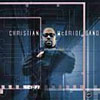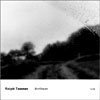
This Week: McBride walks the line between rock and jazz, drummer Bruford sends us dancing, and guitarist Towner goes it alone.
Christian McBride
Sci-Fi (Verve)

Despite reports of jazz fusion's permanent residence in the smooth jazz rest home, there have been sightings of fusion out and about, strutting its stuff. A recent and very welcome sighting comes thanks to bassist Christian McBride—perhaps best known as a young lion of tradition—who arrives in shining armor, intent on rescuing jazz from slick corruptions.
Fusion's decade was the '70s: the infancy of Miles Davis' Bitches Brew (1969), the ripening of Return to Forever's promising debut (1972), Mahavishnu Orchestra's springtide (1974), the maturity of Weather Report's 8:30 (1979), and the final senescence of fuzak, slouching into the '80s. From in-your-face '70s Fillmore West performances to elevator music, who'da thunk it?
Enter the young Mr. McBride who, after 70-plus straight-ahead albums as a sideman, has picked up an electric bass and focused his monster chops on a genre desperately in need of rehabilitation. To assist, McBride enlists Herbie Hancock, Dianne Reeves, David Gilmore, and James Carter.
Sci-Fi opens with a cover of Steely Dan's "Aja," a tune perhaps best known in its original for the searing saxophone of Michael Brecker (another fin de siecle keeper of the fusion flame. On Sci-Fi, guitarist David Gilmore fills Brecker's shoes on the tune, laying down an equally scorching riff or two.
In every other way, Weather Report is Sci-Fi's spiritual guide. Halfway through the recording, Sci-Fi acquires a familiar quality, what with McBride's prominent, woofer-rattling bass on the title cut (echoes of Jaco Pastorious), the keening keyboards on "Havona" (reminiscent of Joe Zawinul), and Ron Blake's soprano saxophone lines on the same (Wayne Shorter?). Certainly a promising starting point for fusion's rejuvenation.
—Jonathan B. Frey
Bill Bruford's Earthworks
The Sound of Surprise (Discipline Global Mobile)

More formal trickery and modern improv from drummer Bruford's acoustic quartet. It's jazz just left of center—too conservative for out-cat territory, and too unconventional for purists. Par for Bruford as a leader; the knottier measures of these tunes betray his training in rock camps. But he always played rock as though he'd rather have been subbing at the Village Vanguard, so why bother with labels? What's important is that the enthusiasm is convincing, and Bruford sounds here like he's having as much fun as he ever did in King Crimson.
The tunes come mostly from the drummer's pen and blend Jarret-like melodic consonance with rhythmic adventure. Bruford drives the opener "Revel Without a Pause" with a masterful touch, and the band indeed revels in some handsome harmony and startling dynamic shifts. Devilish meters dominate "Triplicity" and spur pianist Steve Hamilton (very much the hero of this disc) into colorful rhapsodizing. Alongside these early highlights, there are sketchier offerings. "Half Life" is filler, and the pastel chords and subtle pauses of "Shadow of a Doubt" lead nowhere in particular.
There is a welcome organic sensibility to the final tracks that sends the album out dancing. Double-timed swing and heated tenor from Patrick Clahar fire "Never the Same Way Once," a durable Bruford theme. "Prelude" is a dose of free-form invention before "Stone Woman Dances" peaks the intensity with sinewy soprano lines and stomping percussion. It's a bravura sequence, bright and swinging, and it's as good as Earthworks gets.
—Chris Mitchell
Ralph Towner
Anthem (ECM Records)

Guitarist Towner's style has not so much progressed over the years as it has spread concentrically from an aesthetic center he established long ago. His technical prowess on 12-string and classical guitars is both essential to the music and irrelevant to any marking of distance traveled—better to measure his career in coffee spoons than in new licks deployed. Towner's solo ECM catalog, not without its highs and lows, is an extensive continuum of space and spark, and his latest offering fits right in.
Anthem finds Towner alone, ruminating on tone poems with rubato phrasing and dashes of improvisational fancy. "Solitary Woman" sets the mood apace, its 12-string ringing a pensive chordal theme over rhythmic drones. "Four Comets" explores the art of small gestures before the bright cadence of "Raffish" gives the album its first burst of sunshine. Like many memorable Towner originals, "Raffish" is almost pianistic in its theme, but it gives way to idiomatic guitar musings. "The Prowler" is almost as catchy, with a sly tension in its chromatic turns and subtle rhythmic chug.
Towner returns to 12-string for "Three Comments" and closes with a decorated chorus of Mingus' "Goodbye Pork Pie Hat." It sounds like blues, as heard through the rainy windshield on the album's cover. And so goes Anthem's introspection without indulgence. It's a quiet, confident record whose charms increase with each listen. Towner will forever remain unnoticed by mainstream guitar magazines if he keeps working like this, and that's a wonderful thing.
—Chris Mitchell

June 28, 2001 * Vol. 11, No. 26
© 2001 Metro Pulse
|